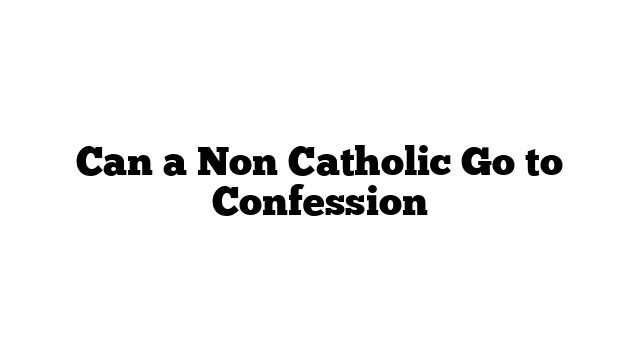Beliefs & Practices
Can Non-Catholics Participate in Confession?
Introduction
Confession, also known as the Sacrament of Penance or Reconciliation, is an essential aspect of the Catholic faith. It provides Catholics with the opportunity to confess their sins to a priest and receive absolution for those sins. However, many non-Catholics may wonder if they can participate in confession or seek guidance from a priest. In this article, we will explore whether non-Catholics can go to confession and the reasons behind the Church’s stance on this matter.
Understanding Confession in the Catholic Church
Confession is considered one of the seven sacraments in the Catholic Church, along with Baptism, Confirmation, Holy Eucharist, Marriage, Holy Orders, and Anointing of the Sick. It is a sacrament of healing, reconciliation, and the forgiveness of sins.
Catholics believe that when they confess their sins to a priest, they are not merely confessing to a human being but to Christ Himself, who works through the priest as His instrument. The priest, acting in persona Christi, offers guidance, spiritual counsel, and absolution, providing believers with a sense of peace and the opportunity to restore their relationship with God and the Church.
The Church’s Teaching on Non-Catholics and Confession
According to the teachings of the Catholic Church, the sacrament of Confession is reserved for baptized Catholics. This means that non-Catholics, including individuals from different Christian denominations and those who do not practice Christianity, are generally not eligible to receive the sacrament.
The reasoning behind this teaching lies in the understanding that the sacraments are intimately connected to the life of the Church and its members. Confession is seen as a means of restoring an individual’s relationship with the Church community. As such, it is primarily intended for those who have been initiated into the Catholic faith through the sacrament of Baptism.
Exceptions to the Rule
While the general rule is that non-Catholics cannot participate in confession, there are a few exceptions. The Church recognizes that in certain extraordinary circumstances, non-Catholics may be permitted to receive the sacrament of Confession. These exceptions include:
1. Danger of Death: In situations where a non-Catholic is in danger of death and expresses a sincere desire for the sacrament, a Catholic priest may administer Confession and offer absolution.
2. Grave and Pressing Need: In some cases, non-Catholics may approach a priest for spiritual guidance, counseling, or moral support. While they cannot receive sacramental absolution, priests are often willing to offer spiritual advice and guidance to those who seek it.
Importance of Open Communication
If a non-Catholic wishes to speak with a priest, it is crucial to be open and honest about their faith background. By clearly communicating their status as a non-Catholic, individuals can ensure that any conversations or guidance received from a priest are respectful of their beliefs and align with the teachings of their own faith.
Alternative Paths for Non-Catholics
While non-Catholics may not have access to the sacrament of Confession in the Catholic Church, there are other avenues for seeking forgiveness and spiritual support. Many Christian denominations offer similar practices, such as private or public confession, spiritual counseling, or prayerful reflection on one’s sins. Non-Catholics can explore these options within their own religious traditions.
Conclusion
Confession holds a significant place in the Catholic faith, providing believers with the opportunity for repentance, forgiveness, and reconciliation. While non-Catholics, in general, are ineligible to participate in the sacrament of Confession, there are exceptions for those in extraordinary circumstances. It is essential for non-Catholics to communicate openly with priests and seek guidance within the context of their own religious traditions. By doing so, individuals can find solace, forgiveness, and spiritual support on their unique spiritual journey.

